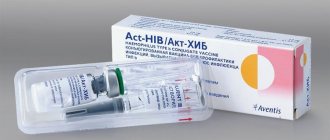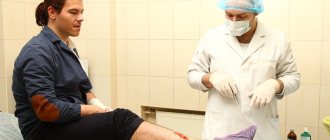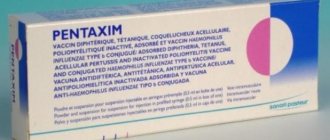Prevenar vaccine
recommended for the prevention of pneumonia in children and adults.
Clinical trials of Prevenar 13 demonstrate a pronounced immune response against all serotypes of pneumococcus that are included in the drug. To date, more than 90 different serotypes of the pneumonia virus have been laboratory identified, but in humans the disease is provoked by only a small percentage of all currently existing serotypes. That is why the Prevenar 13
is used almost all over the world, and allows for the prevention of severe disease in children and adults.
Pneumonia often affects the lungs of adults, and in people over 50 years of age, the risk of complications from infectious diseases increases significantly. vaccine for what?
It contributes to a significant reduction in morbidity rates.
Features of the vaccine
Vaccination Prevenar13
allows you to create a specific barrier against 13 serotypes of pneumococcus, which promotes the formation of antibodies that provide immune protection for the body for a long time and protect it from diseases caused by the pneumonia virus.
Obvious advantages of the Prevenar 13 vaccine
expressed in the following factors:
- Administration of the vaccine becomes possible from 8 weeks of life.
- Maximum protection is provided against all serotypes that are causative agents of the invasive form of pneumonia.
- Antibodies are formed after the first dose of the vaccine is administered.
- Errors in determining the dose of the drug are excluded, since the vaccine is produced in dosage syringes, and therefore is administered with maximum accuracy.
The listed advantages allow vaccination with the recommendations specified in Prevenar 13 instructions for use
.
Vaccination procedure
Immunization with Prevenar 13 is carried out twice in childhood, according to current recommendations enshrined in the vaccination calendar. Thus, two doses of 0.5 ml are administered alternately one after another at intervals of 1 month.
Children over 5 years old are vaccinated once in a dose of 0.5 ml.
Children over 12 years of age and adults are also vaccinated once every 2 years. Patients suffering from chronic diseases need to be vaccinated more often - every 1.5 years.
Description of the drug
The Prevenar vaccine is a drug for the prevention of pneumococcal infection in children starting from 2 months and adults.
Pneumococcal infection is one of the leading causes of child mortality; 800 thousand children under 2 years of age die each year worldwide due to pneumococcal infection. Pneumococcal infection causes a number of dangerous diseases, such as meningitis, pneumonia, bronchitis, otitis media, septicemia, sinusitis, and endocarditis. Often pneumococcal infection occurs in the form of a “regular” ARVI, which complicates diagnosis and increases the risk of developing life-threatening conditions. Vaccination against pneumococcal infection is aimed at preventing the disease, as well as reducing complications from pneumococcal infection and deaths. Indications for use
Prevention of diseases caused by Streptococus pneumoniae (serotypes 1, 3, 4, 5, 6A, 6B, 7F, 9V, 14, 18C, 19 A, 19F and 23F), including sepsis, meningitis, pneumonia, bacteremia and otitis.
The vaccine is intended for use from 2 months of age.
Indications for vaccination
Prevenar vaccination
is a specially developed vaccine that promotes the formation of immunity resistant to the activity of pneumococcal infections. Thanks to this, it is possible to reduce the incidence of the disease and reduce the possibility of complications due to respiratory viruses, influenza, and rhinitis, especially in patients with chronic pathologies. Thus, indications for vaccination include:
- Reduced immunity.
- Patients with diabetes mellitus, diseases of the cardiovascular system, and respiratory organs.
- Smoking.
- Children born prematurely.
- Labor activity that is carried out in crowded places or organizations with a large number of workers.
- People traveling abroad to countries where mandatory immunization is required, including against pneumonia.
Experts recommend buying Prevenar
and do it in cases where a cold often turns into a bacterial infection. Vaccination is indicated for frequent acute respiratory viral infections with complications that recur more than 5 times a year.
Immunization against pneumococcus
The article was prepared by pediatrician Yulia Aleksandrovna Ermolaeva
Vaccination against pneumococcal infection causes the least number of refusals and disputes among parents, since many have heard about the widespread prevalence of pneumococcus.
Its carriage reaches 70% in the population. Pneumococcal infection causes not only acute respiratory infections, pneumonia, otitis, but also such serious diseases as meningitis, arthritis, myocarditis, sepsis, which are difficult to treat.
Self-healing from pneumococcal infection is quite rare and more often there is a need for long courses of antibiotic therapy. Difficulties in treatment will be explained by the resistance of this microbe to antibiotics, due to the widespread use of this group of drugs in recent years.
This reason is the main one determining the need for vaccination. Please note that vaccination with pneumococcal vaccines does not protect against all acute respiratory infections; immunity is formed only to a specific type of pathogen that is included in the vaccine. Accordingly, if the causative agent of the disease is a virus or another bacterial agent, it is incorrect to attribute the disease to the ineffectiveness of this vaccination.
Which vaccine is better Prevenar 13 or Pneumo 23?
There are 96 known serotypes of pneumococci, of which only 20 cause severe illness, the rest, for the most part, do not pose a threat to human health. Vaccination with pneumococcal vaccines protects only against those pneumococci whose serotypes are included in the vaccine.
There are 2 types of vaccines currently registered in the Russian Federation:
- conjugated (Prevenar13, Russia, USA, Netherlands)
- polysaccharide (Pneumovax 23, Netherlands and Pneumo 23, France)
Conjugate vaccines contain 13 serotypes, and polysaccharide vaccines contain 23 serotypes. The Synflorix vaccine has also been developed, which, in addition to 10 serotypes of pneumococcus, includes ADS + Haemophilus influenzae. A natural question arises which vaccine is better to choose.
The conjugate vaccine includes 13 of the most common serotypes; this type of vaccine causes lasting immunity, unlike polysaccharide vaccines, and is approved for use from 2 months of age.
The duration of the immune response when administered polysaccharide vaccines is no more than 5 years, and therefore revaccination with this vaccine is required every 5 years.
But polysaccharide vaccines contain a larger number of serotypes, so frequently ill children, patients with chronic diseases, immunodeficiency conditions, and the elderly can be recommended to administer an additional dose of Pneumo 23 after vaccination with Prevenar 13!
When combining 2 types of pneumococcal vaccines, immunity against pneumococcus will be durable and protect against almost all major pathogenic serotypes of pneumococcus.
Can I get pneumococcal infection after vaccination?
No. Pneumococcal vaccines are non-live; they contain only bacterial antigens, so they do not cause disease.
When is the best time to get vaccinated?
The vaccination schedule against pneumococcal infection has a clear tendency to decrease the number of vaccinations with the age of the child. So, when vaccination starts at 2 months, to create sufficient immunity and carry out a full course of vaccination, 3 administrations of this vaccine will be required, and for children over 2 years old - only one, according to the national calendar of the Russian Federation.
Therefore, many parents ask the question: “why torture a child so much at an early age, he already has a heavy vaccination burden?” The answer is simple. Pneumococcus can strike at any age, but infections in early childhood are much more severe. That is why vaccination against pneumococcus was one of the first to be introduced into the national calendar and is recommended from 2 months of life.
Regarding polysaccharide vaccines, their use is allowed only from 2 years of age.
How to vaccinate correctly if the timing of administration is not met?
Below will be presented vaccination schedules with pneumococcal vaccines in accordance with Order of the Ministry of Health of the Russian Federation No. 125n dated March 21, 2014 as part of the calendar of preventive vaccinations for epidemiological indications. Please note that individual vaccination schedules differ.
Vaccination with conjugate vaccines:
- Basic vaccination schedule: 2 months, 4.5 months + revaccination at 15 months.
- Start of vaccination after 6 months: twice with revaccination in the 2nd year of life. Revaccination is carried out no earlier than 6 months from the last administration.
- Start of vaccination at the age of 12 – 23 months: twice with an interval of at least 8 weeks.
- Over 2 years old without age limit: once.
- Premature babies are vaccinated from 6 weeks according to the following schedule: 3 doses at monthly intervals and revaccination at 12-15 months.
Missed vaccinations with conjugate vaccines do not require repetition; the schedule is determined based on the child’s age. Examples of missed vaccination dates:
- 1 dose up to a year. For children aged 12-23 months, 2 doses are administered at an interval of 8 weeks; over 2 years, one dose is administered once.
- 1 dose at 12-23 months of age, then only one dose is required in any case.
Further revaccinations are not required when receiving the full course of Prevenar 13. Formed immunity is stable.
Polysaccharide vaccines are recommended to be included in a sequential vaccination regimen. At the first stage, a full course of vaccination is carried out with a conjugate vaccine, and at the second - with a polysaccharide vaccine.
The optimal interval between administrations is 12 months, but for children aged 12–18 years and adults in special situations, the interval can be shortened to 8 weeks.
Revaccination with polysaccharide vaccines, if indicated, is carried out with an interval between doses of at least 5 years.
Can the pneumococcal vaccine be combined with other vaccinations?
Yes. Pneumococcal vaccines can be administered simultaneously with any vaccines from the national calendar, except BCG, but in different parts of the body.
Contraindications to vaccination with pneumococcal vaccines:
- severe, severe systemic reactions to previous vaccine administration
- (anaphylactic reactions);
- hypersensitivity to any component of the vaccine;
- acute infectious diseases or exacerbation of chronic ones.
So, the main conclusions:
- Vaccination against pneumococcal infection is mandatory.
- For children and adults at risk for developing pneumococcal infection, a sequential course of immunization is recommended, consisting of the initial administration of a conjugate vaccine (Prevenar 13) followed by the use of a polysaccharide vaccine (Pneumo 23, Pneumovax).
- Vaccination starts from 2 months of age - with a conjugate vaccine (Prevenar 13), from 2 years - with a polysaccharide vaccine (Pneumo 23, Pneumovax).
MAKE AN APPOINTMENT WITH A PEDIATOR
Contraindications
The range of contraindications includes the presence of individual intolerance to the components contained in the vaccine. It is also not recommended to perform immunization in the following cases:
- Exacerbation of diseases present in the patient's medical history.
- Presence of infectious processes or ARVI at the time of vaccination.
- The patient has hyperthermia.
- Against the background of pregnancy.
- Against the background of breastfeeding.
- Ailments of various kinds.
Immunization with the Prevenar 13 vaccine should be carried out only if the patient feels well and has fully recovered from respiratory diseases, and in case of chronic diseases during periods of their subsidence.
And now what this article was intended for.
Since the RuNet turned out to be useless, I studied English-language materials - the manufacturer’s website, mom’s forums, even scientific studies I came across. It is these findings that I would like to share in a brief retelling.
- - In 2006, there were reports of Guillain-Barre Syndrome occurring within 6 weeks of Menactra vaccination, but a large 2012 study of more than 2,000,000 people who received the vaccine found NO increased risk of Guillain-Barre Syndrome. .
- - here is an article that cases of fainting have also been reported after vaccination with Gardasil and some other vaccine unknown to me, they do not have a common component, but the age of administration is the same (teenagers), and the opinion is expressed that the reason is not the drug, but in the procedure itself, which causes discomfort in emotional teenagers. The main danger of fainting is injury from a fall.
- — vaccination is mandatory and free for all 7th grade schoolchildren; without it, they may not be accepted into summer camp. Then, after three years (at 16-18 years), a repeat (booster) dose is administered to consolidate the effect. Students living in New Jersey residence halls are required to be vaccinated against Meningococcus.
- — I was unable to find negative reviews about vaccination besides official reports about fainting, Guillain-Barre Syndrome and others.
The English-language Internet, if not completely reassured me, at least reduced my doubts.
However, I, of course, again dashed off a list of questions, among which were such as “What drugs to relieve the rash” (“Give Suprastin”), “What to give if there is vomiting” (“Can you give Motilium”), what -more, after which Alexander Petrovich advised me to drink valerian and went with me to read the instructions in search of the adverse reactions I mentioned (“Where did you even read about all these horrors?” - “On the official website But they don’t have a website” - “ Yes, in English”) while the nurse took out and prepared the vaccine. The instructions indicate the frequency of side effects, after studying which Alexander Petrovich commented: “Their frequency is comparable to the frequency of side effects of Placebo. During the period of observation of patients after vaccination during clinical trials, vomiting or rash may have occurred due to the person being poisoned, for example, however, this should also be recorded in the report. Don’t worry, the vaccine is very well tolerated, it’s lighter than Pentaxim.”
Possible reactions due to vaccination
In most cases, the Prevenar 13 vaccine is well tolerated, including in young patients and those at risk. You can buy Prevenar in Moscow, followed by an injection for the purpose of immunization. However, in some situations, negative reactions such as pain at the injection site, low-grade fever, malaise, and weakness are observed. In most cases, all these symptoms disappear on their own within a few days without the use of special medications. In extremely rare cases, anaphylactic shock is possible, so at the time of immunization a doctor must be present who can provide first aid with all the necessary equipment.
Update from January 16, 2017
Immediately after the publication of the article, I sent a link to it to the Allegris MC in order to receive comments from competent medical professionals in case I got something wrong and was misleading readers. To my pride, I received a review that did not contain corrections, but there was a comment on the merits, I quote it in its entirety:
«I value the opinion of a thinking mother, especially one so erudite and inquisitive. The only thing I’ll explain is the price of the drug, which depends on the delivery batch. The shorter the residual shelf life, the lower the retail price. That's why we even have Promotions at more attractive prices. Perhaps the pharmacy offers a time-limited vaccine. I usually don’t bully parents about our price list. If there is an opportunity to get vaccinated yourself at a more comfortable price, I always welcome it.
» DMN, Cherdantsev A.P., MC Allegris.
Compatibility with other vaccines
The Prevenar vaccine is combined with all types of vaccinations, so it can be performed simultaneously with them. The exception is the BCG vaccine, which is incompatible with Prevenar 13.
Simultaneous immunization with several vaccinations implies compliance with the basic rules: injections are performed in different parts of the body, and in no case should they be mixed into one syringe.
Prevenar 13 is a high-quality vaccination that provides prevention of serious illness with the ability to prevent complications in people with chronic diseases. The relevance of the vaccine is obvious for use in children and adults, especially those who often suffer from colds and viral diseases.
Disclaimers
- — I do not have a medical education.
Perhaps the article contains factual errors - it does not pretend to be scientific, it is rather an attempt to share information in the form in which I found and understood it. - — I am not an affiliate of
Allegris, the producers of Menactra, etc., this is the independent point of view of an ordinary average mother with a slightly inflated degree of paranoia. - — With this material, I do not call for vaccination
of its opponents, whose opinion I respect just as much as I do not call for vaccination with imported drugs for those who have chosen domestic vaccines. The article is more likely for those who have decided for themselves that vaccinations are necessary, but are still in doubt about Menactra specifically and are studying reviews.






